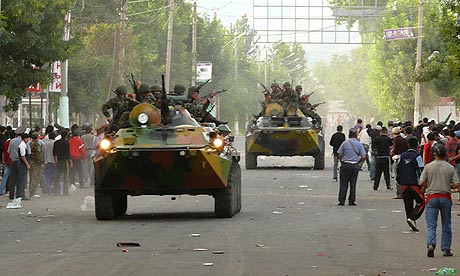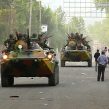
Alarmist International Reporting Alienates Armed Forces and Challenges Stability in Kyrgyzstan
Publication: Eurasia Daily Monitor Volume: 7 Issue: 141
By:

Among others, Human Rights Watch, International Crisis Group, and Medicins Sans Frontiers have blamed Kyrgyz military and police forces for abusing the rights of ethnic Uzbeks in southern Kyrgyzstan in the aftermath of ethnic conflict. Cases of arbitrary detention, severe forms of torture and beating have been widely reported. Kyrgyz NGO’s have also criticized the Kyrgyz government for turning a blind eye to the widespread human rights abuses (www.24.kg, July 14).
While these organizations’ alarmist reporting has shed light on the injustice and devastating human tragedy in southern Kyrgyzstan, they largely fail to place such reporting in a broader context. Underfinanced, underequipped and poorly trained Kyrgyz military and police forces lack experience in dealing with ethnic conflict. As the violence erupted in Osh on June 10, the security forces acted chaotically, short of credible information and clear political leadership. A credible investigation should show how Kyrgyz security structures behaved during the bloodshed and prove that acts of violence were conducted as a result of ethnic hatred and not organizational flaws. Meanwhile, by presenting an incomplete picture, international human rights activists risk distorting an already complicated situation in Kyrgyzstan.
Subjected to international criticism, Kyrgyz police and power institutions are growing increasingly opposed to the idea of any type of investigation into the violence, instead preferring to silence those that might challenge their status, including local NGO activists and foreign journalists. Frustrated about status and reputation, the police in particular seem desperate to conceal their own crimes.
The Organization for Security and Cooperation in Europe (OSCE), currently chaired by Kazakhstan, has urged its members to provide comprehensive support for Kyrgyzstan (www.kaz-news.info, July 18). Dispatching 52 OSCE policemen might be a positive development for Kyrgyzstan, reassuring people in Osh and Jalalabad that a reputable international organization is ready to participate in peace building and peacekeeping. However, in Kyrgyzstan, the OSCE is renowned for its impotence to facilitate any democratic change.
Although earlier OSCE training programs dissuaded the Kyrgyz police from using live ammunition against mass protests, instead preferring rubber bullets, it proved to be of limited value in a country accustomed to authoritarian rule. “They taught us mainly about human rights, you know, their own agenda,” one Kyrgyz policeman told Jamestown about OSCE training in Kyrgyzstan.
In order to contribute to stabilizing Kyrgyzstan, the international community must understand that during a time of uncertainty about the country’s future, Kyrgyz military and police forces have only limited interest in correcting their own behavior and preventing acts of violence against Kyrgyz citizens. Moreover, unless this predicament of Kyrgyz power institutions is addressed, it is likely to mutate into more severe forms of human rights abuse, as low levels of instability continue in the country.
Only after civilian state institutions in Kyrgyzstan are fully established, according to the new constitution and, importantly, supported by the wider population, can one realistically expect more managed and civilized behavior by the military and police. Meanwhile, the military and police remain deeply despised institutions. This year alone, the Kyrgyz education ministry has reported a shortage of new police students, and only half the places in the interior ministry academy have been filled (www.akipress.kg, July 19).
International human rights organizations calling for action will most likely encounter little response from either the civilian leadership or military officials. Both civilians and military leaders have already voiced skepticism over whether an international investigation of the violence in Osh and Jalalabad will contribute to resolving the problem. “Some human rights organizations are intentionally distorting information about the work of the power structures,” according to Interior Minister, Kubatbek Baibolov (www.akipress.kg, July 20). Baibolov has noted the growing negative reporting about the activities of the military and police, yet he was one of the key figures in halting the violence in Osh and Jalalabad.
In this volatile security situation, the number of immigrants among ethnic Uzbeks is growing. According to the Kyrgyz labor ministry, in the past few weeks 8,688 Osh residents have left the country (www.akipress.kg, July 21). Human Rights Watch, claim that large numbers of ethnic Uzbeks are trying to flee to Russia and Uzbekistan. Yet, since both Kyrgyzstan and Uzbekistan have unilaterally shut their borders, some Uzbeks are forced to remain in their burned-out houses in Osh (https://www.hrw.org, July 20). Despite this, little criticism is expressed over Uzbekistan’s unwillingness to open up its borders, or Kazakhstan’s inability to be a more effective OSCE chairman. Instead, the international community chose an easy target to blame –Kyrgyzstan’s weak security forces, which lost the battle against their own citizens the moment violence in southern Kyrgyzstan began.




